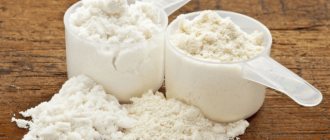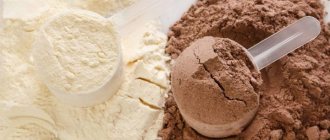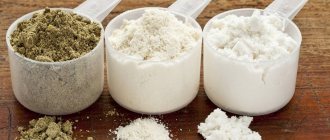Types and features
Protein is the most important supplement for athletes looking to build muscle mass. This product is valuable because it contains a lot of protein - 95%, which our body successfully uses to build muscles.
Protein is a source of amino acids that the body constantly needs. If there is a protein deficiency, the body takes it from the muscles. Therefore, training to build muscle may be useless.
Most often, protein is taken in the form of cocktails, which are easy to prepare yourself. As a rule, in addition to protein, the cocktail contains milk or water and various additives for taste (finely chopped fruits or vegetables).
Before consuming protein, you need to know that proteins are divided according to the types of raw materials from which they are made:
- egg;
- dairy;
- soy;
- whey;
- casein
According to the level of purification, proteins are divided into:
- concentrate;
- isolate;
- hydrolyzate.
According to the rate of absorption, proteins can be fast or slow.
Research has proven that the rate of protein absorption affects the rate of muscle growth - the faster protein is absorbed, the faster muscle growth.
Fast proteins (whey)
The fastest and most popular proteins are whey. BCAA amino acids (Branched-chain amino acids) make up ¼ of whey proteins. Fast proteins are recommended to be used immediately after training.
There are these types of fast protein:
- concentrate is a classic option with a low degree of purification. 20% of its composition is lactose. 90% of this protein is absorbed in 3-4 hours.
- isolate is a purified form containing 90-97% protein. Completely absorbed by the body in 3 hours.
- hydrolyzate is a semi-enzyme-digested version of fast protein that is more effective when taking in mass-building workouts because it has the highest absorption rate. Significantly increases insulin production.
About what whey protein is, the pros and cons of this type of sports nutrition.
Slow proteins (casein)
The slow type of proteins has a rather low absorption rate. This type usually includes casein - a classic protein that is absorbed by the body in 6-8 hours. Slow proteins include:
- soy protein;
- vegetable proteins;
- other proteins that impede enzymatic hydrolysis.
The slow type of protein has a lower value, an imperfect amino acid composition and has little thermogenic and anabolic effect when building muscle mass, so such proteins are recommended to be taken as an adjuvant.
The main source of casein is cottage cheese.
Complex proteins
The use of complex proteins has certain advantages, because they are a combination of fast and slow proteins.
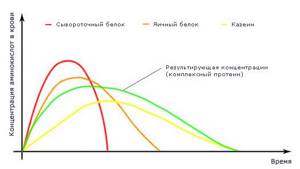
First of all, the complex composition allows you to obtain proteins with different amino acid characteristics and provide maximum nutrition to muscle mass. At the same time, slow proteins have a long-lasting anti-catabolic effect and prolong the effect triggered by fast proteins.
How to take fast proteins correctly
Usually the manufacturer indicates in the instructions how to drink protein correctly. However, the indicated dosages are not entirely digestible, and sometimes testing is required. Naturally, beginners need to start with a minimum dose, gradually increasing the volume.
When to take
Fast proteins should be taken in the morning (20 minutes before breakfast), when the body has used up its own supply of protein, and immediately after training, as a fat-burning agent. After taking whey protein, the body receives the dose of protein and amino acids necessary for bodybuilding and fitness.
Take fast protein cocktails between workouts – 1.5 hours before the next workout. On average, proper protein intake should be 5-6 times a day. At the same time, up to 50% of proteins should be supplied to the body from natural products.
Daily intake of fast proteins
Generally accepted dosages of protein shakes must be adjusted according to individual factors (goals). The generally accepted single dose of protein is 30 g. This is the portion that the body can absorb within two hours.

It is impossible to answer the question of how much protein you should drink unequivocally: the dosage depends on the gender of the person, the subcutaneous fat layer and the purposes for which the protein is taken. If we take average dosages, then the daily dose of protein can be taken in the following quantities:
- to increase weight – 250-350 g for men, 180-300 g for women;
- for weight loss – 130-160 g for men, 100-140 g for women;
- for the formation of body relief - 180-250 g for men, 140-200 g for women.
The optimal nitrogen balance is achieved at a dosage of 1.7-2 g per kilogram of human weight. If this dosage is exceeded, the load on the digestive system increases.
How to properly prepare quick protein
Making your own protein shake from ready-made powder is not difficult, so the question of how to properly prepare protein does not require a complex solution or any special skills.
A serving of protein (25-30 g) is mixed with 300-350 ml of water, milk or juice.
You should not blindly follow the instructions and advice given by friends and on the Internet. Only experts can tell you how to properly consume protein.
How much protein is needed for optimal muscle growth?
Research has been conducted to determine the optimal dose of protein supplements to take during the day.

Slow protein taken during fasting
Canadian scientists conducted tests on a group of young people who performed intense exercise while taking an egg protein supplement.
As a result of the experiment, it was revealed that maximum assimilation occurs with the consumption of 20 grams of protein.
Similar studies were carried out by British scientists. Only they used a milk-based product. The results turned out to be almost identical.
Thus, maximum stimulation of muscle fiber formation is achieved with 20 grams of protein in the body.
When and how to drink casein proteins
When and how to take casein protein, you can read on the packaging. However, there are general rules that everyone must follow.

Time to Eat Slow Proteins
Since casein is focused on providing amino acids and has a longer absorption time, the best time to take it is at night. During sleep, slow-release proteins supply amino acids to recovering muscles. Also, when you know it will be a long time until your next meal, you can drink slow protein.
Casein is ideal for beginners.
When consuming proteins, you must drink enough fluid.
Slow Protein Dosage
To fully provide the body with amino acids when building muscle mass, 30 g (one serving) of slow protein before meals is sufficient.
If slow proteins are taken for weight loss, 15 g is enough.
Eating slow protein can replace 1-2 meals.
How to breed protein
When purchasing ready-made mixtures, many do not know how to dilute protein. After all, if diluted incorrectly, the cocktail will not only taste disgusting, but can also cause digestive problems.
Reasons for the lack of the desired result
The root cause of lack of muscle growth is the insufficient amount of protein consumed by the athlete.
When the protein dose is increased to 20 grams per day, muscle fibers increase. If protein is taken in the maximum amount, but there is no result, then the reason is different.
An incorrect training program, the amount of physical activity, and intensity affect the growth of muscle mass.
Adjusting the training regimen, changing the coach, or changing the gym will help solve the problem.
In addition, the speed of achieving results is influenced by a person’s weight, physique and the quality of sports nutrition.
Buying cheap supplements means deliberately harming your own body.
Rules for using complex proteins
Complex proteins are recommended to be used for various purposes: muscle building, weight loss, relief formation. Therefore, it is important to know how to properly take complete protein.
Best time of day
If your goal is to build muscle mass, then it is better to take a complete protein before bed to provide your muscles with amino acids throughout the night.
To replenish the amino acid pool, you can consume complex proteins before training - 2 hours before. You can take complex proteins during long breaks between meals.

In the case when the complex composition is used for weight loss, such protein should be taken in the same way as for weight gain, only the dosage is halved.
How much to take
The dosage of complex proteins is practically no different from the dosage of fast proteins. A single dose is:
- 30 g – for muscle building;
- 15 g – for weight loss.
What to breed with
Proteins can be diluted with plain water, still mineral water, juice or milk. Experienced athletes recommend diluting the protein with juice or milk before consuming it. In this combination, the body will receive the required amount of carbohydrates and calories. The only condition when choosing milk is that it should not be too fatty.
If the body does not accept milk, it can be replaced with kefir.
Take before bed
Most people believe that eating before going to bed at night is a recipe for accumulating unnecessary fat deposits. This opinion is true regarding the consumption of fats, as well as carbohydrates, but not proteins. Because during sleep the body does not receive food, it draws energy from internal reserves, which is why the process of muscle recovery can be stopped for some time.
A cocktail of slow-acting proteins taken half an hour before bedtime will help prevent nighttime catabolism. This mixture will ensure a normal concentration of amino acids in the blood.
A protein complex that contains micellar casein, whey protein and milk protein is most suitable for these purposes. The cocktail is guaranteed to provide a sufficient amount of nutrients for muscle growth, and will also help improve strength performance.
Protein-containing foods: getting protein from food
Of course, not only protein shakes, but also regular foods can serve as a source of protein. Before you wonder how to drink protein to gain weight, pay attention to foods such as:
- chicken breast;
- eggs;
- fish;
- beef.
All of them, of course, are not so quickly absorbed by the body, but no less useful.
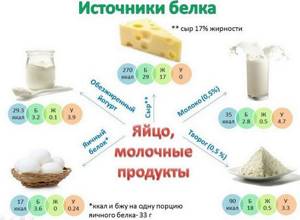
The only source of essential amino acids is natural protein obtained from food.
